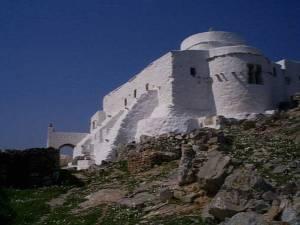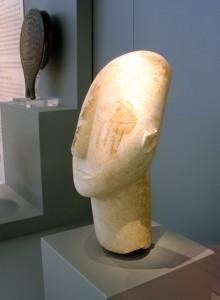Amorgos History
Simonides, the famous ancient Greek lyric poet, was born in Amorgos. Is is Simonides who is the writer of the Epitaph At Thermopylae, written on the Tomb of the soldiers from Sparta who fell defending Greece against the Persian invasion.
 Amorgos has been inhabited since prehistoric times. Old tombs were discovered, dating to as early as 3300 B.C. From the Early Cycladic Period, there were three major settlements, all on the long north coast of the island, and with each one being settled by Amorgos has been inhabited since prehistoric times. Old tombs were discovered, dating to as early as 3300 B.C. From the Early Cycladic Period, there were three major settlements, all on the long north coast of the island, and with each one being settled by  different inhabitants. Modern day Arkessini, furthest southwest, was known as Kastri and was settled by the Naxians. Minoa, the ruins of which lie just above the port of Katapola, was settled by the Samians. The third settlement is near the present-day port of Egiali (also with the same name) and was settled by the Milians. Throughout the centuries, the island came under the rule of many masters, most notably the Venetians who built the fortress in the capital. They held onto the island for three centuries from 1207, until it fell to the Turks. It was finally liberated in 1832 and then united with Greece. different inhabitants. Modern day Arkessini, furthest southwest, was known as Kastri and was settled by the Naxians. Minoa, the ruins of which lie just above the port of Katapola, was settled by the Samians. The third settlement is near the present-day port of Egiali (also with the same name) and was settled by the Milians. Throughout the centuries, the island came under the rule of many masters, most notably the Venetians who built the fortress in the capital. They held onto the island for three centuries from 1207, until it fell to the Turks. It was finally liberated in 1832 and then united with Greece.
It should be noted that, for centuries, the exquisite embroideries made by the women of Amorgos fetched quite high prices and greatly added to the economy of the island. In fact, many pieces are on display in European museums, with some of the finest exhibited at the Victoria and Albert Museum in London. Sadly, what is produced today and sold in the shops, though very lovely, is not of the same standard as was produced by the earlier generations.
It must be noted that Simonides, the famous ancient Greek lyric poet, was born in Amorgos. Is is Simonides who is the writer of the Epitaph At Thermopylae, written on the Tomb of the soldiers from Sparta who fell defending Greece against the Persian invasion. The Epitaph could be translated this way:
Oh, passer-by, report to the Spartans
that we lie here
having obeyed to their commands. |
|



